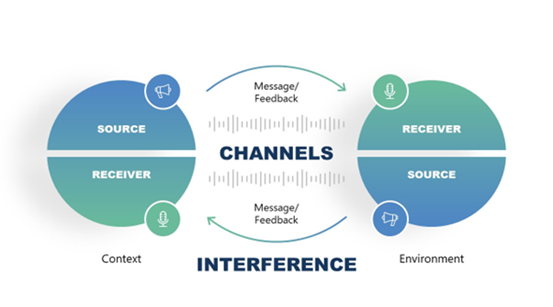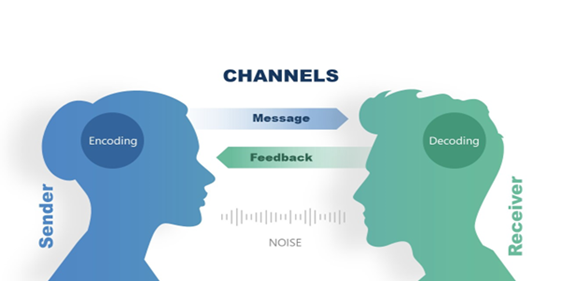Interpersonal communication is the process by which individuals exchange information, feelings, and meaning through verbal and non-verbal messages in various contexts, including personal relationships, professional settings, and social interactions. It involves the ability to convey messages effectively, listen actively, understand others’ perspectives, and build rapport.
Importance of Interpersonal Communication:
1. Building Relationships:
Effective interpersonal communication is essential for building and maintaining relationships, both personal and professional. It helps in establishing trust, understanding, and mutual respect among individuals.
2. Conflict Resolution:
Clear and open communication is crucial for resolving conflicts and disagreements in a constructive manner. It enables individuals to express their concerns, listen to others’ viewpoints, and find mutually acceptable solutions.
3. Teamwork and Collaboration:
In workplace environments, strong interpersonal communication skills facilitate teamwork, collaboration, and synergy among team members. It fosters a positive work culture and enhances productivity.
4. Leadership:
Effective leaders possess strong interpersonal communication skills, enabling them to inspire, motivate, and influence others. They can articulate their vision, provide feedback, and empower their team members to achieve common goals.
5. Customer Relations:
In business settings, interpersonal communication plays a vital role in building and maintaining positive relationships with customers and clients. It enhances customer satisfaction, loyalty, and retention.

Must-Have Soft Skills Training for Interpersonal Communication:
1. Active Listening:
The ability to listen attentively and empathetically, understanding others’ perspectives without interrupting or judging.
2. Verbal Communication:
Clear and concise verbal communication, including the ability to articulate ideas, provide feedback, and deliver presentations effectively.
3. Non-Verbal Communication:
Awareness of non-verbal cues such as body language, facial expressions, and tone of voice, and the ability to use them to enhance communication.
4. Empathy:
Understanding and acknowledging others’ emotions, perspectives, and experiences, and demonstrating empathy in interactions.
5. Conflict Resolution:
Skills for managing conflicts constructively, including problem-solving, negotiation, and compromise.
6. Assertiveness:
The ability to express one’s thoughts, feelings, and needs confidently and respectfully, while also respecting the rights and boundaries of others.
7. Emotional Intelligence:
Awareness and management of one’s emotions and the emotions of others, including self-regulation, empathy, and social skills.

Must-Have Corporate Training for Interpersonal Communication:
1. Communication Workshops:
Interactive workshops focusing on improving communication skills such as active listening, assertiveness, and non-verbal communication.
2. Role-Playing Exercises:
Simulated scenarios and role-playing activities to practice effective communication techniques and conflict resolution strategies.
3. Feedback Sessions:
Providing constructive feedback and coaching to employees to enhance their interpersonal communication skills.
4. Leadership Development Programs:
Training programs for managers and leaders to strengthen their communication and leadership skills, including techniques for motivating and inspiring teams.
5. Emotional Intelligence Training:
Workshops and assessments to develop emotional intelligence skills, including self-awareness, self-regulation, social awareness, and relationship management.
6. Cross-Cultural Communication Training:
Training sessions to help employees navigate cultural differences and communicate effectively in diverse work environments.
7. Ongoing Support and Resources:
Providing access to resources such as online courses, books, and coaching services to support continuous learning and development in interpersonal communication skills.
Conclusion:
In conclusion, interpersonal communication is the foundation of all social interactions, encompassing the exchange of information, emotions, and meaning between individuals. Its importance spans various aspects of life, from personal relationships to professional environments, where effective communication is vital for success and productivity.
Soft skills training for interpersonal communication include active listening, verbal and non-verbal communication, empathy, conflict resolution, assertiveness, and emotional intelligence. These skills enable individuals to build rapport, resolve conflicts, and collaborate effectively with others.
Corporate training plays a crucial role in developing and enhancing interpersonal communication skills within organizations. Workshops, role-playing exercises, feedback sessions, leadership development programs, emotional intelligence training, cross-cultural communication training, and ongoing support resources are essential components of corporate training initiatives aimed at improving interpersonal communication skills among employees.
By investing in the development of these Soft skills Training through corporate training, organizations can foster a culture of effective communication, teamwork, and mutual understanding, ultimately leading to improved relationships, increased productivity, and enhanced organizational success.





Leave a Reply